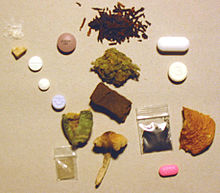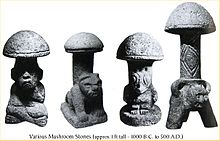Drug
![]()
The title of this article is ambiguous. For other meanings, see Drug (disambiguation).
Since the middle of the 20th century, the word drug has also been used colloquially to refer to intoxicating substances (narcotic drugs, intoxicants or narcotics). These are psychotropic substances and preparations thereof, which can have both a bodily altering effect and a mind- and perception-altering effect. In pharmacological and pharmaceutical terminology, however, the term refers to dried parts of plants, fungi, animals or microorganisms used in the manufacture of medicines (see medicinal drug).
Some psychoactive drugs are traditionally regarded as stimulants in parts of the world and are consumed by large sections of society. These include alcohol (e.g. in the form of beer, wine or spirits; see alcohol consumption), nicotine (tobacco, see smoking), caffeine (coffee, tea), cannabis (marijuana, hashish), cocaine (coca leaves), betel as well as cath. Many stimulants can lead to an altered state of consciousness when used in the appropriate dosage and can be associated with harmful consequences, including dependence and death.
There is no general agreement on whether and to what extent drug use is socially and economically appropriate and tolerable. National legislation and international agreements have largely regulated and restricted the trade, circulation and use of psychotropic substances. The 1971 United Nations Convention on Psychotropic Substances, for example, led to the worldwide prohibition of almost all drugs known at that time; the only exceptions were a few drugs that were already established - mostly in the Western world - such as alcohol, nicotine and caffeine. In fact, however, due to the high demand for other psychotropic drugs, a worldwide shadow economy has emerged.

Various psychoactive substances
About the term
The colloquial use of the term drug in German differs from that in English-speaking countries: there, drug is usually used in the sense of medicinal drug and stands for medicinal substances in general. Recreational drugs, on the other hand, are those psychoactive substances that are taken for recreational purposes rather than therapeutic ones. This term thus corresponds most closely to the German Droge or Rauschdroge.
The term drug is etymologically derived from the Dutch droog for dry (cf. also the originally Low German and largely synonymous word dröge). This, in turn, was adopted into French as drogue, from where it came into German as a loanword around 1600. The further development of meaning was via the (Middle) Dutch or (Middle) Low German phrase droge vaten, which literally meant dry barrels and designated containers for dry goods. As time went on, the adjective droge, or later droog, gradually came to be used as a substitute for the phrase and eventually came to refer only to the contents of such containers. At the time of Dutch colonial rule, these were in particular dried plant products, such as tea and spices. From this meaning, via a detour via French, both the present-day German meaning of the word Droge and the English drug, which is also (and above all) used in the sense of medicine, subsequently developed; see also the German word Drogerie and the article Droge (pharmacy).
In Germany, "narcotic" is a collective term for substances of different origin, composition and effect, the cultivation, production, import and export, distribution, acquisition, possession and trade of which are punishable unless a permit has been granted by the Federal Institute for Drugs and Medical Devices. The colloquial terms "drug" or "narcotic" are not mentioned in the Narcotics Act.
Drug use in prehistory and early history
The use of psychoactive substances and intoxicants can be traced back to the Neolithic period. As early as 6000 BC, viticulture was practised in western Central Asia, and beer was brewed in ancient Egypt and Mesopotamia by 3000 BC at the latest. The use of hemp as a fibre plant is documented for the 3rd millennium BC; cannabis was already used as incense by the Assyrians in pre-Christian times and its intoxicating effect is also mentioned in the Indian Vedas. In the 4th millennium BC, the cultivation of the opium poppy began in the Near East, from where it spread throughout the Mediterranean region and Asia as far as China. Its use as an analgesic and sleep-inducing agent is documented for 1300 BC.
Based on linguistic analysis, evidence exists that the effects of toadstools were known in Siberia more than 5000 years ago; rock drawings dating to 1000 to 2000 BC show figures with mushroom-like heads. Evidence of the use of mushrooms containing psilocybin dates to about 5000 BC. Rock carvings showing mushroom-shaped deities have been discovered in the Tassili Plain in Algeria. In Central and South America, so-called mushroom stones are found, dating from 1000 to 500 BC.
Around 300 BC, Theophrastus of Eresos described the psychoactive properties of datura; tobacco use in the Americas is documented for about the same time.

Cultic mushroom statuettes from Central America
Questions and Answers
Q: What is a drug according to the WHO?
A: According to the WHO, a drug is a substance that can change how a living organism works.
Q: Are all foods considered drugs?
A: No, food is usually not seen as a drug, even though some foods may have such properties.
Q: What are therapeutic and recreational drugs?
A: Drugs that are taken to treat a disease or condition are usually called "therapeutic", while drugs that are taken for fun are called "recreational" drugs.
Q: What is an example of a therapeutic drug?
A: An example of a therapeutic drug may be Aspirin or Paracetamol. These are usually given to treat fever, as well as certain infections.
Q: How does taking too much of a drug affect someone's health?
A: Taking too much of a drug ("too high a dose") can cause sickness or even death.
Q: What is it called when the doctor says what type of drug to take and in what amount?
A: When the doctor says what type of drug to take and in what amount, it is called prescription.
Q: Why might some drugs be illegal in certain countries?
A: Having or taking certain drugs may be illegal in certain countries because they can be very addictive and expensive if sold illegally from drug sellers which could lead to serious results.
Search within the encyclopedia